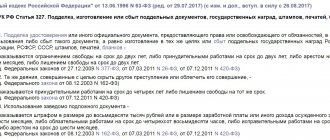In the modern world, information of various kinds is distributed without regard to restrictions. At what age does criminal responsibility begin? Teenagers rely on examples from films and the Internet. And this leads to a misunderstanding of the boundaries of what is allowed and does not contribute to the formation of a methodology for assessing one’s own actions.
The legislation of the Russian Federation was created taking into account the norms of international documents. The “Beijing Rules” dated November 29, 1985 pay special attention to the formation of national rules regarding the age of responsibility for a criminal offense. Let's look at at what age a teenager can be charged with a crime and what are the rules for establishing responsibility for minors.
Basic norms
The age of criminal responsibility is described in Article 20 of the Criminal Code. At the same time, the legislator linked the age of the offender with the severity of the act committed:
- in general, criminal prosecution is carried out against a person who has celebrated his 16th birthday;
- For serious and especially serious crimes, responsibility begins at the age of 14.
Guided by the provisions of the Beijing Rules, the Russian legislator took into account the following features of minors:
- level of mental development that contributes to the formation of the right attitude towards one’s own actions;
- the teenager’s ability to evaluate what is happening;
- the need to influence the offender for educational purposes.
The age of a young person at which criminal liability begins is determined at the time of the crime.
More precisely, from the date following the birthday. For example, if a teenager participated in a robbery on his birthday when he turned 14 years old, then he is not subject to criminal law. According to the norms, the age parameter is counted from zero hours of the next day.
Establishing the age of criminal responsibility
A person who was already 16 years old at the time of committing the crime may be held liable under the Criminal Code.
This is most often referred to by lawyers when answering the question at what age is criminal punishment imposed. Important! Part 2 of the article stipulates that when committing certain types of criminal acts, a child who has reached 14 years of age may be subject to punishment under the Criminal Code. Download for viewing and printing: Article 20 of the Criminal Code of the Russian Federation “The age at which criminal liability begins”
Determining the age of the perpetrator
The legislation contains a nuance that must be followed when determining whether a child can be held accountable. From the point of view of lawyers, the age of the perpetrator of a crime is not determined on his birthday. That is, a 13-year-old child turns 14 only from zero o'clock on the day following his birthday.
If a child does not have documents confirming his age, then this indicator is determined on the basis of a conclusion obtained from the results of a special forensic medical examination. In this case, the day the child is born is the last day of the year contained in the document.
If it is not possible to determine the year of birth of the child, and it is not possible to determine the minimum and maximum number of years, all doubts should be interpreted in favor of the minor.
VUO in legal systems of the world
VLU directly depends on the legal systems operating in countries.
The minimum age at which a child can be punished for committing an unlawful act is established in England; here punishment in criminal cases is possible from 10-17 years. In Germany and Japan, the minimum HEU is similar to Russia and is 14 years.
In America, according to general standards, only a minor child who is already 16 years old at the time of committing criminal acts that have negative consequences can be subject to punishment. It is believed that from this moment he can realize the danger of his actions and fully manage them. However, in some states there are exceptions to this rule.
When does criminal liability begin (general age of involvement under the Criminal Code of the Russian Federation)
To the question: at what age does criminal liability begin, Part 1 of Art. 20 of the Criminal Code of the Russian Federation. According to its rules, 16-year-old persons can bear criminal liability for most of the crimes described in the Special Part of the Criminal Code of the Russian Federation.
This age was not determined by chance: it is believed that it is by the age of 16 that the level of mental and mental development of a healthy person allows him to fully understand the essence and consequences of his actions and be responsible for them.
However, there are a number of exceptions to this rule - both in the direction of decreasing and increasing age.
Onset of responsibility from the age of 14
Part 2 art. 20 of the Criminal Code of the Russian Federation contains a list of acts for which responsibility begins at the age of 14. The reason for this decision is that the social danger and criminal nature of these actions are so obvious that already at this age a teenager is able to understand them and their consequences. Crimes for which the age of criminal responsibility has been reduced encroach on almost all benefits protected by law, in particular:
- life and health (Articles 105, 111–112);
- sexual integrity of the person (Articles 131 and 132);
- property (Articles 158, 161, 162);
- public safety (Article 205, 205.6), etc. - about 30 norms in total.
Another exception to the rule about the age at which criminal liability becomes possible is established in Part 3 of Art. 20 of the Criminal Code of the Russian Federation. The norm allows for the release from punishment of minors who are mentally or mentally retarded in development, which is why they are not capable of realizing the danger of their act. Such facts should not be associated with mental illness. Of course, exemption from liability is possible only if there is a psychological and psychiatric report confirming the fact of the lag.
How exactly are minors punished?
Russian criminal law allows almost all types of punishments to be applied to minors:
- Fine. His teenager pays himself if he has his own income. In other cases, the court may shift its payment to the parents if they agree to be responsible for their child.
- Deprivation of rights to some activity.
- Compulsory work during free time from study or work.
- Correct the work. If the teenager is employed, he will serve them at his place of work; if not, by a court decision, the issue of his employment can be decided at the discretion of the local municipality.
- Restriction of freedom or deprivation of it. A restriction is a ban on leaving your home at a certain time, traveling to another area, or attending some event. Imprisonment is the same punishment as for adults, the only difference being that it is served in special educational colonies.
Onset of responsibility from the age of 18
A number of norms of the Special Part of the Criminal Code of the Russian Federation contain an indication of the mandatory age of the subject directly in the disposition. These, in particular, include Art. 134 and 135 (sexual intercourse with a person under 16 years of age and indecent assault, respectively). Thus, the responsibility of minors for such crimes is impossible.
IMPORTANT! Special mention should be made of crimes involving a special subject. So, despite the fact that the elements of official crimes do not establish the achievement of 18 years as a mandatory characteristic of subjects, this follows from the provisions of other regulations.
Yes, Art. 292.1 provides punishment for officials who illegally issue Russian passports to foreigners. The issuance of passports falls within the competence of the internal affairs bodies, whose employees, by virtue of Art. 8 of the regulations on service in the internal affairs department (approved by Resolution of the Supreme Court of the Russian Federation of December 23, 1992 No. 4201-I) a person cannot be under 18 years of age. Thus, the mandatory majority of the subject of this crime becomes obvious.
Also read: How to write a report about phone theft
Under what articles does criminal liability arise at the age of 14?
Imprisonment in a correctional colony is imposed for serious criminal acts, including murder, terrorism and grand theft. From the age of 14, persons convicted under the following articles can sit in the dock:
- intentional murder of one or more people - Art. 105 of the Criminal Code of the Russian Federation;
- Infliction of harm to health of moderate severity intentionally - Art. 112 of the Criminal Code of the Russian Federation;
- infliction of grievous bodily harm - Art. 111 of the Criminal Code of the Russian Federation;
- rape - Art. 131 of the Criminal Code of the Russian Federation;
- kidnapping for any purpose - Art. 126 of the Criminal Code of the Russian Federation;
- robbery with the ensuing consequences, committed by one person or a group of persons in conspiracy - Art. 162 of the Criminal Code of the Russian Federation;
- violent actions with sexual overtones - Art. 132 of the Criminal Code of the Russian Federation;
- car theft - Art. 166 of the Criminal Code of the Russian Federation;
- obvious extortion - Art. 163 of the Criminal Code of the Russian Federation;
- robbery and theft - art. 161 of the Criminal Code of the Russian Federation and Art. 158 of the Criminal Code of the Russian Federation, respectively;
- participation in terrorist groups - all parts of Art. 205 of the Criminal Code of the Russian Federation;
- production and sale of explosives - art. 223.1 of the Criminal Code of the Russian Federation;
- Hooliganism under aggravating circumstances - Art. 213 of the Criminal Code of the Russian Federation and some other articles.
You can clarify the criminal liability of a 14-year-old teenager in a specific case from experienced lawyers by phone or on our company’s website.
Note! The legislation clearly defines the age limit at which criminal liability begins. For minors, a number of leniencies and restrictions on punishment are provided in the form of a maximum term of imprisonment of 10 years.
Features of age calculation
As a rule, the number of completed years of the accused is established from personal documents. These for minors are:
- birth certificate (up to 14 years);
- passport (after execution).
In forensic science, there is a method for determining the physical age of a suspect in the absence of an identity card. It is applied to teenagers who have committed an act that is subject to criminal liability under a reduced age parameter.
In practice, a forensic medical examination is carried out. Based on an examination of the physical condition of the accused, a presumable age is established. The data is reflected in the corresponding act. The birthday is recognized as the last day of the year indicated in the specialist’s conclusion.
There are often cases when experts cannot accurately determine the number of years. In such situations, framework parameters are included in the act: the minimum and maximum number of years according to physical indicators. In this case, the expert’s doubt is interpreted in favor of the accused.
Attention: the age of the suspect is determined by the minimum parameter specified in the forensic medical examination report.
If the parameter does not comply with the standards of Article 20 of the Criminal Code, then the teenager cannot be held accountable for a criminal offense of any gravity. In other situations, the usual investigation and trial are carried out.
An examination is also carried out in relation to a teenager with obvious mental disorders. Moreover, the legislator especially highlighted the fact that the minor offender did not have a disease, as determined by doctors. Doctors and psychologists work with the teenager to determine his ability to realize what he has done and feel guilty.
How is a teenager's age determined?
The age of persons against whom criminal cases have been initiated can be easily determined from their identification documents: passport or birth certificate.
The moment when liability arises does not begin on the person’s birthday, but on the day following it. Committing theft or robbery on his birthday exempts him from punishment under the provisions of the Criminal Code of the Russian Federation if he turns 14 on that day.
In some court cases, it can be difficult to collect documents that can be used to judge the age of the individuals appearing in court. For example, children engaged in vagrancy or living in extremely disadvantaged families in which their birth was not even registered. A special examination is entrusted with determining the number of full years of a child suspected of a crime. The exact date of birth is considered to be the last day of the year indicated by experts as the year of birth.
When considering criminal cases involving teenagers, a very serious approach is required. Reaching the required age in itself does not entail charges. Some teenagers are unable to evaluate their actions due to developmental delays. Therefore, applying punishment to them will not achieve the goal of achieving their correction. After all, it is obvious that the teenager does not understand the danger of his actions.
Article 20 part 3 of the Criminal Code of the Russian Federation provides for the release of such a minor from criminal punishment. Not all minors are at the same stage of development. If during a court hearing, when examining the case materials, the court has suspicions regarding the mental retardation of the defendant, then an examination will be ordered in his respect.
Maximum VUO
The maximum age at which it is possible to apply punishment to a criminal is not limited in any way. That is, even an elderly person who committed an illegal act will be convicted to the fullest extent of the law.
The only exception is cases when a person, due to mental illness, could not realize the negative consequences of his actions and their danger. An examination is carried out in his regard, based on the results of which the mental state of the criminal is determined.
If such a study reveals a mental disorder, the guilty person is sent for treatment or detention in a special institution.
Application of the age norm in practice
The arrival of the established age of responsibility for a criminal act does not mean that a teenager is equated to an adult criminal. The General Section of the Code describes the rules for imposing punishment on persons who have not reached official maturity. Thus, the Plenum of the RF Armed Forces recommended that courts treat minor defendants with special attention (Resolution No. 1 of 02/01/11). The document contains the following instructions:
- When considering cases against teenagers, take into account not only the social danger of the act, but also the conditions of upbringing and life of the minor offender (Article 98 of the Criminal Code).
- It is necessary to consider the detrimental influence on the young offender from adult comrades. To do this, the characteristics of the latter are requested.
- The court must consider the characteristics of the individual. To do this, a specialized specialist – a psychologist or teacher – is invited to the meeting.
- When considering the case, the social and living conditions in the young man’s family are taken into account, as well as the parents’ fulfillment of responsibilities for raising and maintaining children.
- It is recommended to sentence teenagers to prison only if the court is firmly convinced that it is impossible to reform the offender in the wild.
Important: the judge is obliged to create all conditions for organizing the protection of the rights of a minor accused.
Parents, teachers, juvenile affairs workers, lawyers and other people are allowed to participate in the process.
However, loved ones may be excluded from the list of participants in the process. The law allows a judge to remove a father, mother or other relative from the courtroom if a person improperly insists on criminal liability for a child. In such a situation, the responsibility for protecting the minor falls on municipal employees and the state lawyer.
Criminal liability of minors in 2018
Let's move directly to the types of criminal liability of minors. This includes fines, compulsory and correctional labor, arrest, suspended and real prison terms.
A teenager can be fined if he has income or property. If this is not the case, the obligation to pay money to the treasury will pass to the parents of the offender. The amount can range from 1 to 50 thousand rubles. A fine in the amount of the teenager’s income for a period of up to six months may also be levied.
The period of compulsory work for persons under 18 years of age has also been reduced. It ranges from 40 to 160 hours. There is a clause in the law that violators perform work in their free time from school. Moreover, if the attacker is under 15 years old, he is prohibited from working more than two hours a day. At the age of 15 to 16 years, you can work for a maximum of 3 hours a day. Older offenders are given the same period as adults.
The term of correctional labor cannot be more than one year. It is prohibited to arrest children for more than 2 years.
Note!
Prison does not threaten offenders under 16 years of age who have committed a crime of minor or moderate gravity. A person over 16 years of age will not be imprisoned for committing a minor illegal act for the first time.
In general, a teenager under 16 years old cannot be given more than 6 years in prison. However, even 14 and 15-year-olds can be sentenced to up to 10 years in prison for a particularly serious violation of the law. 10 years is the maximum prison sentence for criminals under 18 years of age.
In addition to standard sanctions, compulsory educational measures and placement in a closed educational institution are also applied to minor violators.
The first include:
- warning - employees of the commission for minors, police conduct a conversation with the offender, explain the danger of his act and the possible consequences, talk about what he faces if he is detained again;
- transfer to supervision - the attacker can be transferred to the supervision of police officers, guardianship authorities, and parents. They are obliged to control the behavior of the punished and be responsible for his actions;
- demand to make amends - the offender or his parents have the right to compensate the victim of the crime or the damage caused. In addition, the law allows you to eliminate the consequences of the crime yourself. For example, repair a broken fence.
- restriction of leisure time - in this case, the teenager may be prohibited from attending entertainment events, places of public leisure, leaving the house at night, etc.
The court has the right to determine one of the sanctions listed above or several. The term depends on how serious the crime the teenager committed. Usually it is 2-3 years.
However, educational measures are introduced as long as the offender behaves appropriately and does not break the law. If there is no need to talk about correction, the case materials are transferred to the police so that the teenager can be brought to real criminal responsibility.
In some cases, these measures may apply to older offenders - up to 20 years old.
Misuse of legislation
The criminal world is well aware of the peculiarities of bringing teenagers to justice for a criminal act. Often they try to take advantage of this. For example, they persuade a teenager to take all the blame on himself when the offense was committed by a gang. In such a situation, both the young man himself and his adult accomplices violate the law.
The trial, based on general principles, is structured in such a way that the guilt of each gang member is identified and proven. The testimony of a teenager who incriminates himself may not be taken into account. The prosecutor and the inquiry collect the entire volume of data about what happened.
Also read: Urgent necessity in criminal law: what does it mean in simple words
The issue of amending Article 20 of the Criminal Code is constantly discussed in society. But for now, increasing the age of responsibility seems unlikely. Statistics show that teenagers commit particularly violent crimes. And the state needs to address issues of preventing violence, and not abolishing the threshold of punishment.
Punishments for minors
For murder under Article 105 of the Criminal Code of the Russian Federation, minors are punished with imprisonment for a maximum term of up to 10 years, regardless of the number of episodes. The court takes into account the total number of years under each article (if there are several of them), their total value, which has a limit of 10 years.
For other crimes, measures are provided for in Art. 88 of the Criminal Code of the Russian Federation:
- a fine imposed on the working/unemployed culprit, as well as his parents/guardians;
- deprivation of the right to engage in activities for a certain period of time;
- compulsory or correctional labor;
- restriction of freedom according to Art. 53 of the Criminal Code of the Russian Federation;
- imprisonment for up to 10 years.
Note! Minors cannot be sentenced to: deprivation of a military/honorary title, life imprisonment or the death penalty, detention in a disciplinary military unit, or restrictions on service.
Additional conditions for sentencing and punishment for juveniles aged 14 to 18 years:
- It is allowed to re-assign a suspended sentence if a new offense is committed during the probationary period. The decision regarding the measure is made by the court, taking into account the circumstances of the case and the identity of the perpetrator;
- deprivation of liberty is applied only in cases where otherwise is impossible based on the circumstances of the case by a court decision;
- the punishment is established taking into account the general rules in accordance with Art. 60 of the Criminal Code of the Russian Federation, but also taking into account mitigating circumstances (clause 2 of Article 89 of the Criminal Code of the Russian Federation)
The table shows penalties for teenagers:
| Types of punishment | Term/amount of punishment for those aged 18 years and older | Term/amount of punishment from 14 to 16 years of age | Term/amount of punishment from 14 to 18 years of age |
| Fine | up to 1.5 million rubles | from 1 to 50 thousand rubles. | |
| Mandatory work | up to 380 hours | from 40 to 160 hours in free time from study, but no more than 2-3 hours a day | |
| Restriction of freedom | in accordance with the article of the Criminal Code of the Russian Federation | from 2 months to 2 years | |
| Correctional work | maximum 1 year | ||
| Deprivation of liberty | according to the standard established by law, up to life imprisonment | up to 6 years | up to 10 years. |
For any questions regarding preventive measures and the responsibility of minors, you can consult with a competent lawyer of our company.
What crimes can be punished from the age of 14?
The identification of a group of illegal acts with a lower educational level is due to the danger of such crimes and the child’s perception of prohibitions.
It is because of the last reason that the category of criminal acts entailing prosecution from the age of 14 includes crimes the danger of which is already clear at this age.
The list of illegal acts includes:
- Attacks on human life and freedom;
- Crimes against sexual integrity;
- Acts committed in relation to someone else's property;
- Crimes aimed at public safety.
That is, such illegal acts are expressed in the active actions of the guilty person, which entailed material consequences.
Another criterion for such crimes is the form of guilt. According to the law, minors aged 14 to 16 years cannot be held accountable under the Criminal Code if the unlawful act was committed through negligence.
Mitigating and aggravating circumstances
There are a number of general mitigating circumstances, in the presence of which the punishment will be reduced:
- The teenager broke the law for the first time;
- Has children;
- Teenage girl is pregnant;
- Difficult circumstances that caused the crime;
- He was forced to commit a crime;
- The victim behaved immorally, harming or threatening the teenager;
- Provided assistance to the victim;
- Turned himself in to the police.
Often the teenager receives a suspended sentence. And even if caught a second time for a not too serious crime, he may again receive a suspended sentence.
In the case of a serious crime, the minimum sentence for a teenager is halved.
Aggravating circumstances are considered:
- Relapse;
- Serious damage from his actions;
- Participation in a criminal group;
- Presence of motives of racial, national or religious hatred;
- Assault on a pregnant woman or child;
- Concealing traces of this or another crime;
- Particular cruelty.
Compulsory educational measures
Such light measures of punishment and education include:
- Warning;
- Supervision;
- Compensation for harm;
- Restricting access to entertainment.
Also read: What will happen to a minor for theft?
Such measures can be prescribed for a period of 2-3 years. If a child does not comply with the instructions (does not show up for supervision, etc.), then educational measures are replaced with criminal punishment. To do this, his case is sent to court.
Age of criminal responsibility in other countries
For comparison, let's look at when they can be held accountable in other states.
In countries where traditional Islamic law (Sharia) is in force, theoretically a girl can be punished from the age of 9, and a boy from the age of 12. In practice, most often even here a higher age limit is used: 17 years for women, 18 for men (although In Iran, some crimes can be punished even from 6 years old).
In Ukraine and Kazakhstan, the rules are similar to Russian ones: 16 years is the general age; from 14, it is possible to be held accountable only for certain categories of acts.
In England and Ireland the minimum age is 10 years.
USA - almost everywhere from the age of 16, although in some regions the limit may be lower.
France - from 13 years old.
Why does criminal liability begin at 14 years of age?
The age limit at which a person who has committed a serious crime is brought to justice was established taking into account the statistics of recent decades, during which the growth of crime among minors has increased significantly. Factors such as:
- findings of child psychologists;
- the result of personal conversations with the perpetrators;
- activities of teaching staff in school institutions.
According to Art. 20 of the Criminal Code of the Russian Federation, punishment for light offenses begins at the age of 16, and for serious crimes directed against society and human life, punishment begins at the age of 14.
Age may influence the judge's decision
The age of criminal responsibility is specified in the legislation of the Russian Federation, and the number of juvenile offenders continues to grow, but punishment does not always follow .
The reasons are not difficult to understand, because under certain conditions judges try to find a more lenient solution.
If a minor is put on trial , even the prosecutor often demands a reduced sentence. So, it can be replaced with house arrest with registration. Such steps are easy to understand; no one wants to ruin a person’s life.
Although legal history confirms the mistakes of such trials. Feeling impunity, the child again commits a crime, which in some cases leads to worse consequences.
The age of criminal responsibility is constantly debated. Judicial practice shows that it cannot be increased. The number of crimes committed at an early age continues to rise.
For this reason, we have to constantly face similar cases and tough decisions. Moreover, in recent years, violations for the most part have been associated not with hijackings and thefts , but with robbery, rape and grievous bodily harm, so the statistics remain deplorable.
Minimum VUO in the Criminal Code of the Russian Federation
The need to determine the minimum SRL is contained in the UN Standard Rules.
This normative act notes that in those legal systems where the possibility of bringing minor children to criminal liability is assumed, the lower limit of the age established in the normative acts should not be too low. The same act stipulates that, in providing a minimum age for criminal liability, legislators must take into account human development, that is, if spiritual, emotional and intellectual activity, which changes significantly during growing up.
Download for viewing and printing:
UN General Assembly Resolution of November 29, 1985 “UN Standard Minimum Rules for the Administration of Juvenile Justice (Beijing Rules)”
Judicial practice of the Russian Federation in relation to minors
In practice, Russian courts are extremely loyal to teenagers, even those who have repeatedly committed crimes or violated the rules of probation. An example of such an attitude is the decision of the Blagoveshchensky District Court dated March 6, 2017 No. 4/17-11/17, by which the court refused to extend the probationary period for a suspended minor due to the fact that he changed his place of residence without notifying the regulatory authorities.
The court justified its position by the fact that the convict did not commit other violations of the order of serving the sentence and, at the time of filing the complaint, returned to his previous place of residence and regularly appeared for registration. As an analysis of judicial practice shows, even repeatedly convicted minors are given less severe punishments than adults for similar acts.
It remains to conclude that the Criminal Code of the Russian Federation contains exceptions to the rule on the 16-year age of criminal responsibility for the most obvious crimes, acts for which responsibility is possible only for adults, as well as for persons whose mental and mental development does not allow them to realize the danger and the nature of the acts they commit. At the same time, the Criminal Code of the Russian Federation demonstrates as much as possible the desire to re-educate minors without isolation from society.
Grounds for criminal prosecution of minors
Articles 87-96 of the Criminal Code of the Russian Federation tell us at what age the criminal liability of minors begins and why teenagers can be punished. From them you can learn about the peculiarities of sentencing, the types of sanctions that courts apply to persons under 18 years of age, the procedure for applying penalties, educational methods of influencing minors, as well as exemption from punishment.
Regardless of who the offender is, a teenager or an adult, when imposing a sanction, the courts rely on the principles established by law:
- the punishment must be fair;
- a more stringent measure is applied only when a less stringent one does not give the required result;
- a more severe measure can be obtained based on the totality of crimes;
- the judge takes into account the personality of the offender, the circumstances of the crime, motives, mitigating and aggravating factors, and the characteristics of the life of the accused.
Nuances
Criminal liability does not begin on the day a child turns 14, but on the next day. When committing a crime on his birthday, a minor can avoid punishment, which will be imposed on his legal representatives.
There are cases when a document confirming a person’s age is missing. In this situation, a medical examination is carried out, which establishes the number of full years of the defendant. In such circumstances, the exact date of birth will be December 31 of the year established by the medical report. Minors who have committed particularly dangerous public acts between the ages of 11 and 14 may be forcibly sent to study in special closed or open educational institutions. This type of rehabilitation is not a criminal punishment. The main function of such institutions is the correction of delinquent behavior and social adaptation of children in society.
If a teenager who has reached the age of 14 has committed a crime, but a forensic examination has established that the psychological age of the defendant is less than his chronological age, the minor is exempt from punishment. Upon reaching 18 years of age, a criminal is released from liability only if he is diagnosed with a psychiatric disorder—referring to infantility in this case is pointless.
The loyal attitude of judges to the age of criminals sometimes contributes to increased control over the child by parents. Unfortunately, adults are not always able to protect children from dysfunctional friends. Relapses are common among minors. This is due to the fact that the communication environment has a great influence on the child’s behavior. Proper work is not carried out with children who have committed a crime and received a suspended sentence, which could form and change the way of thinking and understanding of responsibility for their actions.
Release of minors from criminal liability
The Criminal Code of the Russian Federation contains grounds for exempting minors from criminal liability. For example, a teenager will not be seriously punished if he committed a crime of minor or moderate gravity. In this case, the courts in most cases apply educational measures.
A minor who has committed a serious violation may also be exempt from criminal liability, but in this case he will be placed in a special closed educational institution for a maximum of three years. In such institutions, teachers and psychologists work with children, and special living conditions are created for correction. A teenager will be able to return home earlier than scheduled due to good behavior or serious illness.
Note!
Exemption of minors from criminal liability is impossible in case of committing a particularly serious crime.
The length of stay in a special institution can be either reduced or increased by the court. The second option is possible if the teenager has escaped from a correctional institution or needs further supervision.
Often children who end up in such an institution want to extend their stay there in order to complete their studies; the law allows them to apply for this.
Release on parole is possible if the teenager has already served a third of the sentence (for minor, moderate and serious crimes) or ⅔ of the established period (if a particularly serious crime has been committed).
A person under 18 years of age can also be released from the sanction if the statute of limitations has expired. Such periods for persons under 18 years of age are half the periods established for adult offenders and are:
- a year - for acts of minor gravity;
- three years - for acts of medium gravity;
- five years for serious crimes;
- 7.5 years - for especially serious acts.









